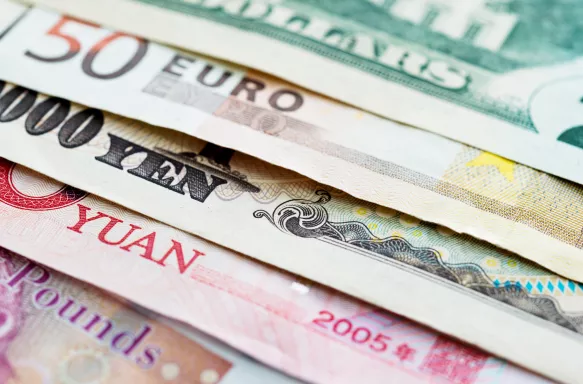How to Save Money Abroad

Planning and keeping to a holiday budget can be a challenge when you’re off jet-setting and having fun. Half of British holidaymakers (50%) have recently said that they’ve gone over budget at least once when travelling. With so many things to keep track of when you’re on holiday, from currency conversion rates to unexpected city taxes and credit card charges, it’s no surprise that the balance book occasionally falls by the wayside.
We’ve spoken to 2,000 British travellers about their holiday spending habits. Our research has highlighted common pressure points for you to be aware of, so you can get more of a handle on your next holiday budget without having to spend all your time watching the pennies.

Where To Exchange Money
Getting the most of your holiday money can start before you even embark on your trip. One way you can maximise your spending power is by searching out the best exchange rates for your currency. Our survey revealed that we are still creatures of habit when it comes to buying our holiday currency, with almost 8 in 10 (79%) of us still exchanging currency at our bank or local post office. Almost 1 in 10 (8%) even regularly take their chances exchanging at the airport before they travel, despite often incurring much higher costs.
Banks, post offices and credit unions can offer some good exchange rates to customers, especially if you’re willing to shop around. Relatively few people, however, are currently looking down alternative routes that can potentially save you money – such as exchanging currency in your destination. Less than one quarter (24%) of people have exchanged cash in the country they are travelling to (either at a currency exchange or by withdrawing from a cash point).
Changing to the local currency after you’ve arrived can often offer better exchange rates than changing at home. The reason for this is because the currency is more plentiful in the country where it is used, which often means it is less expensive.
Of course, some exchange bureaus abroad, particularly those near popular tourist attractions and airports, can be expensive, but visiting one local use could save you money. Withdrawing money from cashpoints abroad can also help cut conversion costs. If you have a bank that offers foreign transaction fee free credit and debit cards and find a fee-free cash machine, this can often result in a lower expense than converting at a bank in the UK.
Watch Out For Unexpected Charges
Budgets often get broken by charges and costs we hadn’t anticipated. Over half of British travellers (52%) admit to being caught out by unexpected charges. The most common things people were caught out by are:
- Credit card charges:19%
- Calls and texts: 17%
- Mobile roaming: 16%
- City tax: 14%
- Baggage allowance: 13%
To avoid these on your next trip, take a little bit of time beforehand to read up on which might apply to you. A quick call or email to your phone service provider and the bank should clarify issues around mobile roaming, call, text and card charges.
When it comes to city tax, you should be able to easily check whether this will apply to your trip by checking online tourist boards. City tax is applied in some cities and is a charge for tourists staying overnight in the area. By planning ahead, you can build this into your budget. If you book with Riviera Travel all city taxes are included in the price of your trip
As for baggage allowance, check what you get as standard on all flights on your trip. Stick to less than this so that you have room to bring back purchases and souvenirs. It’s also worth reading up on your airline’s extra baggage charges, so you’ve got an idea of what you’ll be paying if you do go over the weight limit.

Tipping Overseas
Finding the right amount to tip can be a difficult thing to get right. Too much or too little and you risk causing confusion or offence. Despite the importance of tipping has in many countries around the world, few people research this before going abroad. One-third (32%) simply tip the standard 10% expected in the UK without looking into the matter further.
Just one in five (21%) spend time researching tipping customs in their chosen holiday destination. Get to grips with proper tipping etiquette before your next trip with our handy tipping guide here: Guide to Tipping in Europe, Asia, the US and Around the World
Haggle On Your Holiday
Negotiating with market sellers overseas can often save you money, but it can be difficult to do if you’re not used to it. Less than half of Brits (44%) say they would feel comfortable haggling, which means they could be missing out on key saving opportunities. Not only this, but if you give it a chance haggling can be fun! It gives you a chance to interact with locals and can great for setting yourself little challenges.
Although haggling is not something we do day-to-day in the UK, many countries, including Egypt, China and Turkey, expect people to haggle. For this reason, if you accept the first price you are given, you might be over-charged.
Some helpful hints on how to haggle overseas are:
- Have a fixed price in mind that you are willing to pay before you start haggling and start by offering half of that amount
- Shop around
- Try not to appear too eager
- Haggle with a friend alongside you to reinforce your price
- Take your time
- Don’t be afraid to walk away

Avoid Being Overcharged
Haggling is a big part of preventing someone overcharging you and it’s an important thing to look at if you’re wanting to stay in budget on your holiday. Over half (51%) of British holidaymakers have been overcharged for something abroad, with the most common pain points being:
- Taxis: 26%
- Food: 22%
- Drinks: 21%
- Souvenirs: 14%
- Visitor attractions: 12%
- Tour guides: 9%
While you’re away, be particularly vigilant on these points. Keep an understanding of the value of the currency you’re using, and make sure what you are being charged is reasonable. Check with taxi drivers, tour guides and restaurant vendors about prices and any hidden extras before you agree to use their services.
Looking for ways to save money on your next trip abroad? Check out our top tips and guide right here.
Preparing for your trip in the ways highlighted above and keeping an eye on common areas for overspend should help you keep control of your holiday budget. This means you can worry less and throw yourself into all the fun and relaxation of your trip without having to figure out financial shortfalls when you get home.
If you have any questions, please do not hesitate to contact us.



